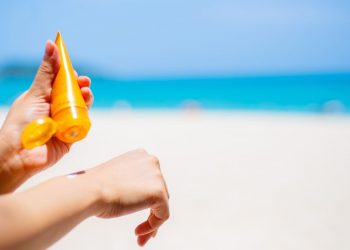Are you baffled by choices and terminology every time you try to look for the best sunscreens? Wondering what SPF is, and which is the best formulation for your skin? You are exactly where answers to all these queries and much more about sunscreens can be found.
Naturally when it is about skin a word from a dermatologist is the one we can all trust. Skin specialists recommend the following suggestion for general use and selection of a sunscreens. Besides wearing a good sunscreen, you should also protect your skin all year round, click here.
HOW TO CHOOSE SUNSCREENS
- Dermatologists recommend using a sunscreen with SPF 30 and higher.
- SPF stands for sun protection factor and the greater the SPF means greater the protection from the sun.
- Sunscreens in lotion form are preferred by dermatologists because of easier spreadability and application.
- People who have sensitive skin should choose mineral sunscreens also known as physical sunscreens.
- Always check SPF when selecting a sunblock.
- Choose one labeled broad spectrum. A broad-spectrum sunblock means it will block both UVA and UVB rays from the sun. Overexposure to these can cause pigmentation, sunburns, wrinkles, premature aging, and skin cancer.
- If you have a known allergy to any specific ingredient always check for that and stay away from sunblocks that contain these.
- People with oily acne-prone skin should go for a sunscreen that is mentioned to be “non-comedogenic” which implies it would not clog pores.
- Those with dry skin should choose moisturizers that offer sun protection or opt for sunblocks with hydrating ingredients such as ceramides and hyaluronic acid.

A MINI GUIDE TO APPLYING SUNSCREENS
- You should be applying sunscreens through-out the ear and not just on sunnier days.
- You need to wear sunscreen indoors too. However, for indoors you can choose one with lower SPF.
- You need to reapply sunscreen several times a day ideally after every 2 hours.
- Applying sunscreen on your lips will protect them from sun damage. Some lipsticks or lip balms have added SPF. For intense sunny days outside you can choose a sunscreen made exclusively for lips.
- Ideally, you should cover all the exposed areas of your skin with sunblock.
- Always apply sunblock half-hour in advance to stepping out in sun.
- Know that no sunscreen offers 100% sun protection. So in addition to a sunscreen use hats, gloves, umbrella and seek shade whenever possible.
NEUTROGENA ULTRA SHEER
This particular sun block has the highest SPF and is recommended by many dermatologists for this very reason. Because the majority of masses end up not reapplying the sunblock during the day. Neutrogena ultra sheer has a quick-absorbing formula, is non-greasy, and leaves no shine and residue on your skin. It can easily be worn under makeup also. It is water-resistant as well. All in all its a good choice suitable for all skin types but people with sensitive skin should always do a patch test before applying.




